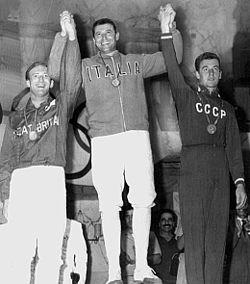 Jay (left) at the 1960 Olympics | |||||||||||||||||||||||||||||||||||||||||||||||||||||
| Personal information | |||||||||||||||||||||||||||||||||||||||||||||||||||||
|---|---|---|---|---|---|---|---|---|---|---|---|---|---|---|---|---|---|---|---|---|---|---|---|---|---|---|---|---|---|---|---|---|---|---|---|---|---|---|---|---|---|---|---|---|---|---|---|---|---|---|---|---|---|
| Born | 30 June 1931 London, England | ||||||||||||||||||||||||||||||||||||||||||||||||||||
| Height | 175 cm (5 ft 9 in) | ||||||||||||||||||||||||||||||||||||||||||||||||||||
| Weight | 80 kg (176 lb) | ||||||||||||||||||||||||||||||||||||||||||||||||||||
| Sport | |||||||||||||||||||||||||||||||||||||||||||||||||||||
| Country | |||||||||||||||||||||||||||||||||||||||||||||||||||||
| Sport | Fencing | ||||||||||||||||||||||||||||||||||||||||||||||||||||
| Event(s) | Foil and epee | ||||||||||||||||||||||||||||||||||||||||||||||||||||
Medal record
| |||||||||||||||||||||||||||||||||||||||||||||||||||||
Allan Louis Neville Jay MBE (born 30 June 1931) is a British former five-time-Olympian foil and épée fencer, and world champion.
Early life
Jay was born in London, England, and is Jewish.[1][2] His father died fighting in World War II in 1943.[2] He attended Cheltenham College from 1944 to 1948.[2] He spent much of his childhood in Australia.
After 1950 he returned to Britain to study law at the University of Oxford, and later worked as a solicitor while serving as fencing official with the Fédération Internationale d'Escrime. Jay and his wife Carole have two children.[3]
Fencing career
He competed internationally in 1950 for Australia.
He was Great Britain's épée champion in 1952, 1959, 1960, and 1961, and Great Britain's foil champion in 1963.[4]
One of the most successful fencers in British history, Jay competed in five Olympics in both épée and foil, winning silver medals at the 1960 Rome Olympics in individual and team épée.[5][6] He was Great Britain's flag bearer in the 1964 Olympic Games.[2]
At the World Fencing Championships, Jay won a bronze medal in team foil in 1955, a bronze medal in individual foil in 1957, and a gold medal in individual foil while also winning a silver medal in individual épée in 1959, becoming the first British world champion in foil and the last fencer to win two individual medals in one year.[7][8]
He won three gold medals while fencing both foil and épée at each of the 1953 Maccabiah Games and the 1957 Maccabiah Games.[5][1][9] He is a member of the International Jewish Sports Hall of Fame, having been elected in 1985.[7][2]
See also
- List of athletes with the most appearances at Olympic Games
- List of select Jewish fencers
References
- ^ a b "Eight Jewish Athletes at BEG". The Canadian Jewish Chronicle. 30 July 1954.
- ^ a b c d e Ron Kaplan (2015). The Jewish Olympics: The History of the Maccabiah Games. Skyhorse Publishing. p. 38. ISBN 978-1-63220-855-2.
- ^ "Looking back to our Olympic glory"
- ^ W. Rubinstein; Michael A. Jolles (2011). The Palgrave Dictionary of Anglo-Jewish History. Palgrave Macmillan UK. p. 473. ISBN 978-0-230-30466-6.
- ^ a b "Allan Jay". Jewishsports.net. 30 June 1931. Retrieved 26 May 2014.
- ^ "Olympics Statistics: Allan Jay". databaseolympics.com. Archived from the original on 17 October 2012. Retrieved 19 September 2010.
- ^ a b "Allan Jay Olympic Results". sports-reference.com. Archived from the original on 17 April 2020. Retrieved 19 September 2010.
- ^ Bob Wechsler (2008). Day by Day in Jewish Sports History. KTAV Publishing House, Inc. p. 197. ISBN 978-0-88125-969-8.
- ^ Joseph M. Siegman (1992). The International Jewish Sports Hall of Fame. SP Books. p. 102. ISBN 978-1-56171-028-7.
External links
- "Olympic results". Archived from the original on 27 August 2008. Retrieved 23 September 2013.
- Commonwealth Games medals
- Jewish Sports bio
- Jews in Sports bio
- Jewish Sports Legends bio